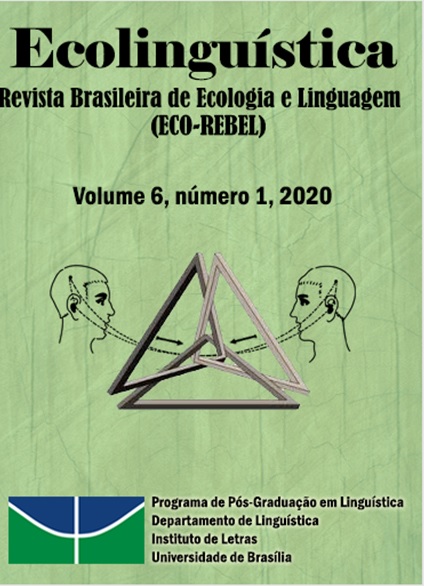Quo vadis ecolinguistics
Abstract
The genre of this paper is aalpiri (Australian Western Desert languages for 'morning growl') and it spells out the reasons why have been less than happy with the way ecolinguistics has developed in recent years. In my opinion, ecolinguistics does not live up to the expectations of its founders and the whole enterprise is far less than the sum of its parts. Much of ecolinguistics is driven by ideology rather than rigid scholarly research and its efficacy leaves much to be desired. The title suggests that ecolinguists have to reflect on where they are going.
Downloads
References
Idström, A. & Piirainen, E. (Eds.). (2012). Endangered metaphors. Amsterdam: Benjamins.
Jung, M. (1996). Ökologische Sprachkritik. In: A. Fill (Ed.), Sprachökologie und Ökolinguistik (pp. 149-173). Tübingen: Stauffenburg.
Ketteman, B. & Penz, H. (Eds.). (2000). ECOnstructing Language, Nature and Society. The Ecolinguistic Project Revisited. Essays in Honour of Alwin Fill. Tübingen: Stauffenburg.
Korzybski, A. (1933). Science and Sanity. Lancaster P.A.: The Science Press Printing Company.
Lorenz, K. (1973). Die Rückseite des Spiegels - Versuch einer Naturgeschichte menschlichen Erkennens. München: Piper
Lorenz, K. (1982). Die acht Todsiinden der zivilisierten Menschheit. Miinchen: Piper.
Lovelock, J. (1988) The Ages of Gaia. Oxford: Oxford University Press.
Marko, G. (2000). Go Veggie! A Critical Discourse Analysis ofa Text for Vegetarian Beginners. In B. Ketteman & H. Penz (Eds.), ECOnstructing Language, Nature and Society. The Ecolinguistic Project Revisited. Essays in Honour of Alwin Fill (pp. 217-240). Tübingen: Stauffenburg.
Mühlhäusler, P. (1983). Talking About Environmental Issues. Language and Communication, 3(1), 71-81.
Mühlhäusler, P. (1995). Metaphors others live by. Language and Communication, 15 (3), 281-288.
Mühlhäusler, P. (1996). Linguistic adaptation to changed environmental conditions: Some lessons from the past. In A. Fill (Ed.) Sprachökologie und Ökolinguistik (pp. 105-130). Tiibingen: Stauffenburg.
Mühlhäusler, P. (1997). Language Ecology: Contact Without Conflict. In: Martin Pütz (Ed.) Language Choices: Conditions, Constraints, and Consequences (pp. 3-15). Amsterdam: Benjamins.
Mühlhäusler, P. (2000). Bleached Language on Unbleached Paper: The Language of Ecotourism. In B. Ketteman & H. Penz (Eds.), ECOnstructing Language, Nature and Society. The Ecolinguistic Project Revisited. Essays in Honour of Alwin Fill (pp. 241-253). Tubingen: Stauffenburg Verlag.
Mühlhäusler, P. (2003). Language of Environment: Environment of Language. London: Battlebridge Publications.
Mühlhäusler, P. (2006). Naming languages, drawing language boundaries and maintaining languages, with special reference to the linguistic situation in Papua New Guinea. In: D. Cunningham, D. E. Ingram & K. Sumbuk (Eds.), Language diversity in the Pacific: Endangerment and survival (pp. 24-39). Clevedon: Multilingual Matters.
Mühlhäusler, P. & Peace, A. (2006). Environmental Discourses. Annual Review of Anthropology, 35, 457-479
Mühlhäusler, P. & Damania, R. (2004). Economic costs and benefits of Australian Indigenous languages: Discussion Paper. Canberra: Department of Communication, Information Technology and the Arts (DCITA).
Myerson, G. & Rydin, Y. (1996). The Language of Environment: A new rhetoric. UCL Press: London.
Reddy, M. J. (1979). The conduit metaphor: A case of frame conflict in our language about language. In A. Ortony (Ed.), Metaphor and Thought (pp. 284-310). Cambridge: Cambridge University Press.
Toffler, A. (1970). Future Shock. New York: Random House.
Wohlleben, P. (2016). The hidden life of trees. London: William Collin
Downloads
Published
How to Cite
Issue
Section
License
Authors who publish in this journal agree to the following terms:
Authors retain copyright and grant the journal the right of first publication. The work is simultaneously licensed under the Creative Commons Attribution License allowing the sharing of the work with acknowledgment of the authorship of the work and initial publication in this journal.
Authors are authorized to enter into additional contracts separately for non-exclusive distribution of the version of the work published in this journal (e.g., publishing in institutional repositories or as book chapters), with acknowledgment of authorship and initial publication in this journal.
Authors are allowed and encouraged to post and distribute their work online (e.g., in institutional repositories or on their personal page) at any point before or during the editorial process, as this can bring about productive revisions as well as increase impact.
Citation of published works (See The Effect of Free Access).



3.png)



